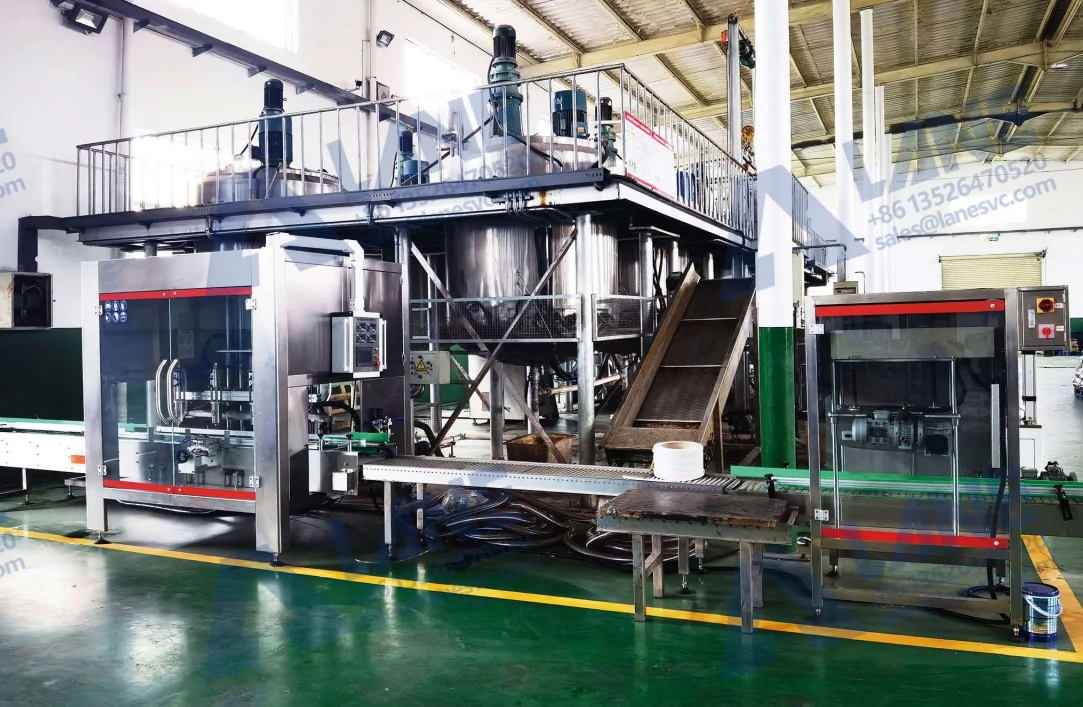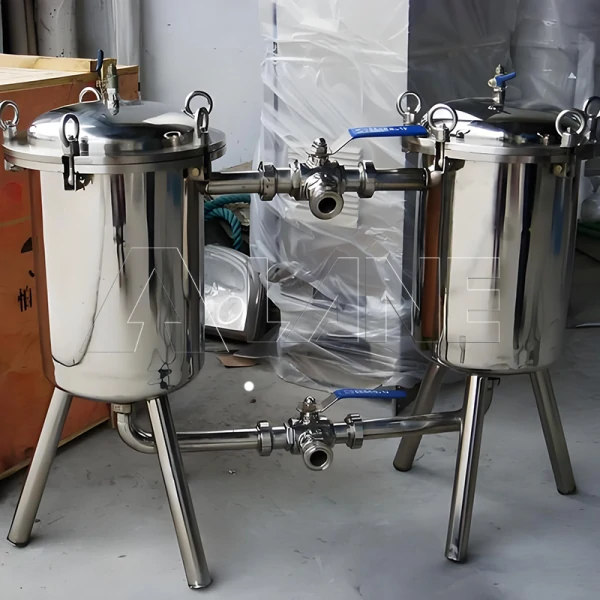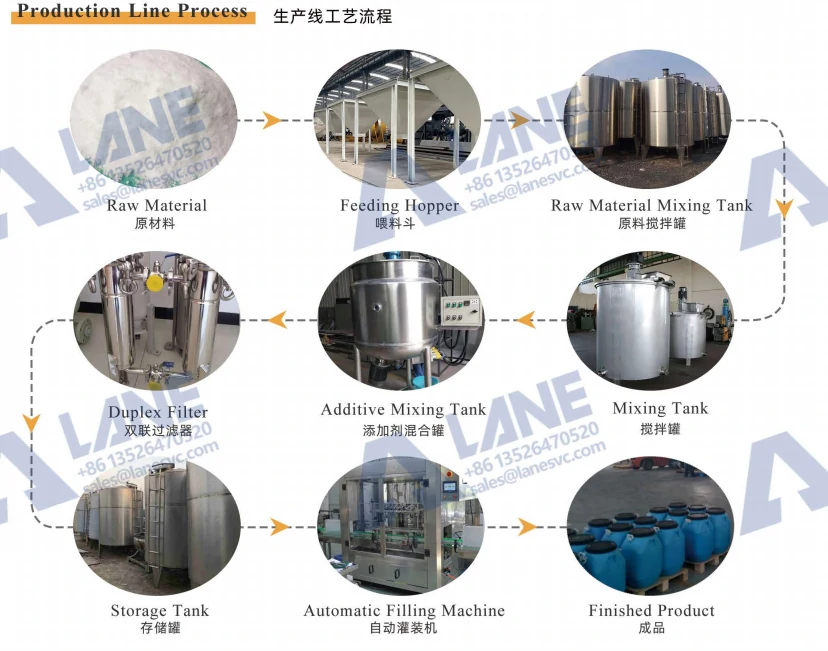
Liquid Fertilizer Production Line for Farmland Irrigation: Boosting Efficiency from Factory to Field
In the age of precision agriculture, the demand for high-efficiency and eco-friendly fertilizer solutions has never been greater. One of the most transformative developments in this space is the liquid fertilizer production line for farmland irrigation.
Designed to manufacture nutrient-rich, water-soluble fertilizers, these production lines form the backbone of modern fertigation systems. Whether you’re a fertilizer manufacturer, agricultural cooperative, or commercial farm, investing in a well-engineered production line can dramatically enhance product quality, irrigation compatibility, and crop performance.
The liquid fertilizer production line for farmland irrigation refers to a complete set of equipment and process flow for producing liquid nutrient formulas suitable for fertigation.
From metering and mixing of raw materials to homogenization, filtration and packaging, LANE’s liquid fertilizer production line for farmland irrigation ensures that each batch of fertilizer is consistent and stable and can be directly used in drip irrigation, pivot irrigation or sprinkler irrigation systems.
Unlike general-purpose fertilizer plants, a liquid fertilizer production line for farmland irrigation must meet specific quality and handling requirements:
Full solubility to avoid clogging irrigation nozzles;
Stable pH and concentration for controlled nutrient release;
Low sedimentation rate to maintain long shelf life;
Compatibility with automation systems for precise fertigation;
A dedicated production line allows you to meet these standards at scale—ensuring your fertilizers are truly optimized for field performance.
A well-designed liquid fertilizer production line follows a precise, efficient sequence of operations, ensuring consistency, safety, and nutritional integrity at every stage.
1.Raw Material Handling & Feeding Hopper
The process begins with sourcing raw materials—typically nutrient-rich organic substances or chemical inputs. These are delivered into a feeding hopper, which regulates material flow into the system. The hopper helps control feed rates, reduce clogging, and maintain consistent input volumes for downstream processes.
2.Raw Material Mixing Tank
Next, the materials enter the raw material mixing tank, where coarse blending begins. This stage ensures initial homogenization, breaking down larger particulates and enabling even moisture distribution. The tank may be heated or agitated depending on the viscosity and type of fertilizer being produced.
From there, contents are transferred into the main mixing tank, which performs intensive mixing. This tank typically features mechanical or hydraulic agitators to fully integrate all ingredients into a uniform solution, optimizing nutrient balance and fluid texture.
4.Additive Mixing Tank
Optional additives—such as trace minerals, pH buffers, biostimulants, or preservatives—are introduced in the additive mixing tank. This dedicated unit allows for precise dosing and prevents interaction issues that may occur if additives were blended too early.
The mixed liquid passes through a duplex filter, removing suspended solids, impurities, or clumps that could block pipes or nozzles in irrigation systems. This step ensures that the fertilizer remains smooth and safe for field application, especially in drip or spray irrigation.

Once filtered, the finished liquid is transferred to a storage tank. These tanks are designed to preserve product stability over time, using anti-corrosion linings and temperature controls to prevent fermentation, precipitation, or microbial growth.
The final step is precision packaging using an automatic filling machine. This system dispenses exact volumes of fertilizer into bottles, pouches, or barrels, ensuring hygiene, speed, and minimal waste. Modern filling units also support labeling and batch coding for traceability.

A regional farming cooperative in Saudi Arabia partnered with LANE to install a liquid fertilizer production line for farmland irrigation designed to serve date palm and wheat farmers across multiple agricultural zones.
By utilizing this advanced liquid fertilizer production line for farmland irrigation, the cooperative was able to improve nutrient management and streamline fertigation practices tailored to local soil and climate conditions.
Results after 1 year:
Reduced fertilizer costs by 30% through efficient production and precise irrigation delivery
Cut fertilizer application time by 50% by integrating fertigation with irrigation systems
Introduced 3 custom liquid fertilizer blends optimized for soil data and crop needs
Increased member satisfaction and regional crop yields by 18%, boosting overall farm productivity

Investing in a liquid fertilizer production line for farmland irrigation brings a host of technical, economic, and agronomic benefits that can significantly enhance both manufacturing operations and downstream crop yields.
1.Efficient nutrient delivery in modern agriculture
Liquid fertilizers are quickly absorbed by crops and are ideal for precision agriculture and integrated water and fertilizer systems. Dedicated production lines allow manufacturers to customize nutrient content with high precision, ensuring that crops get the nutrients they need at every growth stage. This means faster nutrient absorption, better plant health, and higher yields.
2.Customization and flexibility
Having a comprehensive production line makes it easier to produce customized fertilizers for specific soil types, crops, or climate conditions. Whether the end user needs a high-nitrogen formula for leafy vegetables or a balanced nitrogen, phosphorus, and potassium blend for field crops, the line can accommodate a variety of formulations and minimize downtime between batches.
3.Reduced production costs
Making liquid fertilizers in-house instead of sourcing them externally can reduce long-term costs. Bulk purchasing of raw materials, simplified processing, and reduced packaging waste all help improve operational cost-effectiveness. Automated systems also reduce labor requirements and minimize human errors.
4.Improved product quality and consistency
Modern production lines enable strict control of the mixing, filtering, and storage processes. This makes the final product uniform in composition, free of impurities, and stable over the long term. Consistency is especially important for irrigation applications, where clogged nozzles and uneven nutrient application can damage crops and infrastructure.
5.Environmental and sustainability benefits
Liquid fertilizers produced on efficient production lines can utilize organic waste, digestate, or other renewable inputs. This not only supports circular agriculture, but also reduces reliance on synthetic inputs. In addition, localized production reduces the carbon footprint associated with transportation and packaging.
6.Scalable business growth
As the market demand for sustainable agricultural solutions continues to grow, having a scalable liquid fertilizer production line enables manufacturers to respond quickly. Additional capacity can be built into the system, or new product lines (such as biostimulants or micronutrient solutions) can be added without completely transforming the core infrastructure.
7.Competitive market advantages
Companies that control their own production are able to respond more flexibly to customer needs and market changes. By providing consistent quality, faster delivery times, and customized products, producers can build stronger customer relationships and establish a trusted brand in the fertilizer market.
The future of farming is efficient, data-driven, and sustainable. A liquid fertilizer production line for farmland irrigation is more than just a factory—it’s the bridge between smart production and smart farming.
From sourcing raw nutrients to delivering plant-ready formulations through a precision irrigation system, every step matters. Whether you’re aiming to scale your agribusiness, meet eco-standards, or serve local farmers with better fertilizer products, now is the time to invest in a system that supports long-term growth—from factory to field.
For more details, please feel free to contact us.
Henan Lane Heavy Industry Machinery Technology Co., Ltd.
Email: sales@lanesvc.com
Contact number: +86 13526470520
Whatsapp: +86 13526470520
Leave a Comment
LANE has more than 500 successful cases and is committed to providing customers with first-class solutions, high-end machinery and equipment, and one-stop pre-sales, sales and after-sales comprehensive customer service.